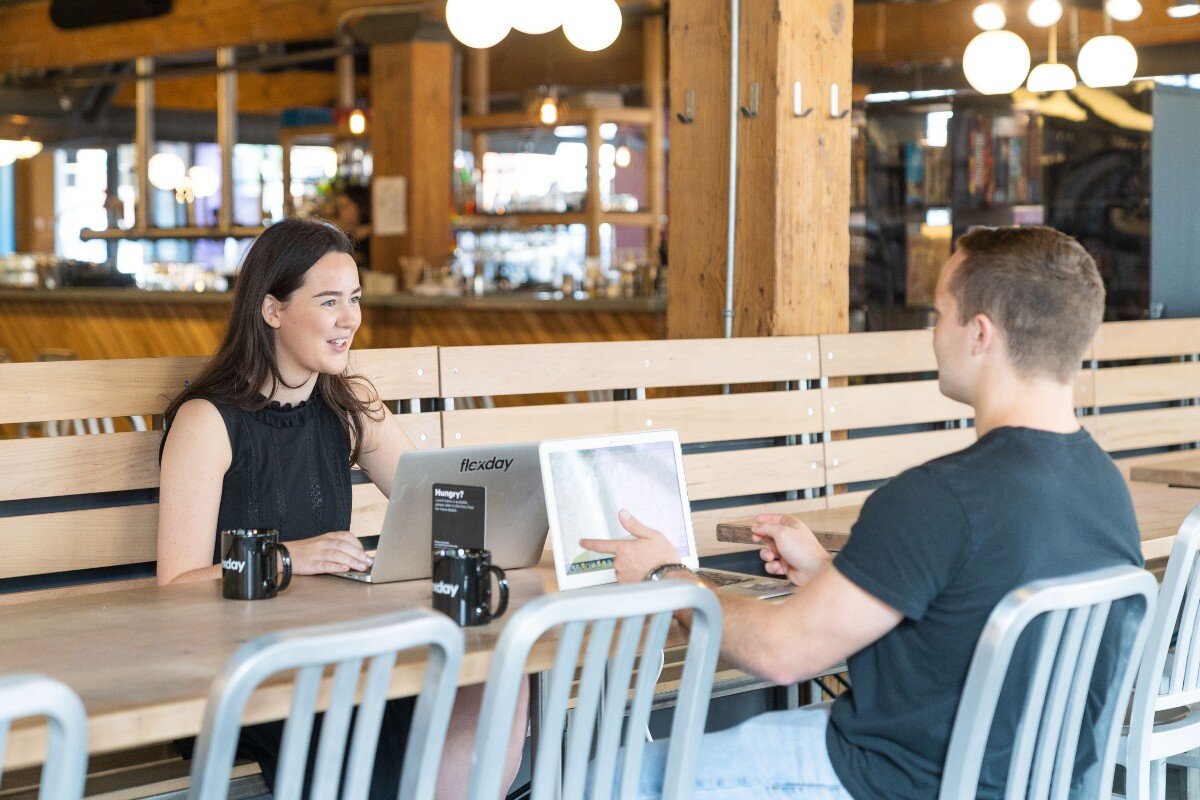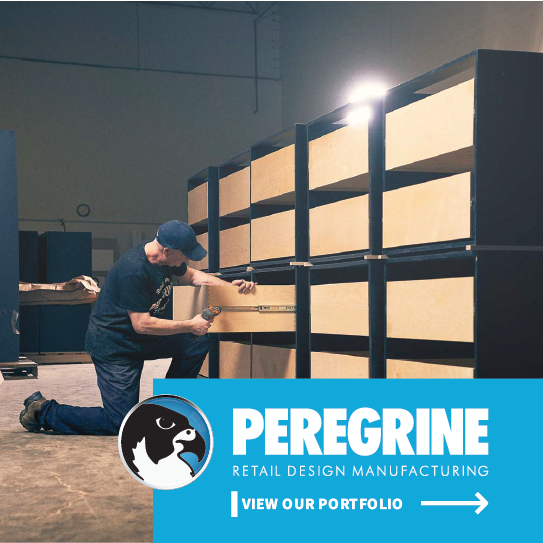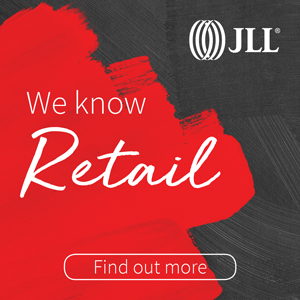Flexible Work Space Concept Targets Under-Utilized Retailers in Canada
/photo: flexday
By Mario Toneguzzi
A Toronto-based company has developed an app to help people find their ideal flexible work space in under-utilized places such as restaurants, coffee shops, and retail stores.
Flexday curates inspiring and available work spaces to help people become more productive. Each location gives a person fast WiFi and power within reach, perks like unlimited coffee, and remote working peers.
The idea has been hugely successful and the company is looking to expand the concept to other cities in the future.
Justin Raymond, founder and CEO of Flexday, said the company went to market in October 2017 starting with two restaurants in downtown Toronto.
photos: flexday
“We wanted to see if the concept was something people were interested in. It’s been fascinating. This is a new product in a new category. It’s very fresh. I think open-minded people and early adopters love it. As a startup you sort of need to listen to the market and business that’s going to be sustainable and beneficial to all parties. So that’s what we’ve been doing. It’s been a lot of fun,” said Raymond.
Flexday is a network of work-friendly spaces across Toronto giving people access to productive work space where and when they need it. The company currently has 42 locations across Toronto and they’re all accessible on demand through the company’s app.
The app will show someone the locations around them. When they are ready they can select a location to check in and they will be issued an entry pass. That entry pass allows people to walk into a location whether it’s a restaurant or a hotel or a retail store or a co-working place and spend as much time as they need there to get their work done.
photo: flexday
People will have a guaranteed seat waiting for them. It’s enterprise grade WiFi on a secure network. Power is within reach and perks can include free coffee, tea and other things depending on the location.
“We have over 7,000 members now in Toronto and we’re a four and a half to five-star rated app. People rate their visits every day. They love it. We’re always looking for ways to improve it. So our member base always provides us with ideas or gives us helpful tips or recommend new locations,” said Raymond. “Some people use it one to two times a week. Some people use it three or four times a week. The bottom line is that people keep coming back and they ask for more locations.
“Probably the most compelling stat I can give you is that over last 60 days we’ve had 900 location requests from new members.”
photo: flexday linkedin
photo: flexday twitter
Raymond said the company has plans in the future to roll out the idea to other cities.
“In order to do this properly, you’ve got to do it really well in one city. So you’ve got to create that playbook and have everything flourishing and then once it’s really working then you can move it to new cities and new footprints. We’re building the right mix now of different types of spaces. Once we get that down, we’re planning to roll out literally hundreds of locations in the next year and when we have that roll out down pat we’ll be looking to move to new cities,” he said.
So what is the benefit for a restaurant or a coffee shop to use this service?
“We focus on bringing a tremendous amount of awareness to the location first and foremost. Every day people open up our app and they become familiar with the locations, the restaurants, the retail shops, the different hotels that are in the area. They become familiar with those locations so it’s another great way to showcase what you’re doing and how you’re welcoming people into your space,” said Raymond.
“The second part is foot traffic. We believe and all our partners love the fact that they get to meet new people in their spaces in a new context. Foot traffic is very important because at the end of the day . . . they want to establish relationships with people in their area. They want to be relevant and they want to establish this partnership and help them in what they need to accomplish.”
The bonus spin for the locations is the word of mouth through social media they are receiving when people post where they’re at and what they’re doing.
There is also a revenue sharing component between Flexday and the partners.
photos: flexday (ollie quinn)
“Probably the most exciting partnership we have right now is on the retail side. Ollie Quinn which is a UK-based eyewear store. Beautiful spaces. They’re right across Canada. They believe in community and connecting with the neighbourhoods around their stores. They were telling people that they could come in and use it as a co-working option or a co-working space. But it couldn’t get any traction because it was just a one-off,” said Raymond.
“So they approached Flexday and asked if they could put their space in our network - in our app and share it with our members. We thought it was a fantastic idea and we did it immediately. Over the last four months, it’s been exceptional. It’s been one of our top performing locations. We see several hundred meaningful visits every month now and the relationships that the store has built with their community and their neighbours through this is beneficial for them through a business perspective. All of our members receive a discount on their products and on the eye examination.”
photo: flexday (ollie quinn workspace)
Michael Kehoe, a broker and retail expert with Fairfield Commercial Real Estate in Calgary, said familiar patterns of work and the workplace are being upended as the race toward innovation intensifies and organizations and professionals around the world work on a project-based and hype-collaborative manner in the gig-economy.
“Organizations and their in-house teams or outsourced contractors are hyper-collaborators who navigate a fluid, fast-paced flow of information, interdependent ideas and the places they work have changed dramatically.
photos: flexday (ollie quinn workspace)
Workspace providers are innovating in new ways, disrupting the traditional office space/landlord/tenant model,” said Kehoe.
“Mobile professionals seeking temporary work spaces as now seen as a valuable commodity and are being courted by workspace providers to activate venues by occupying seats in restaurants and cafes in non-peak dining hours by providing complimentary amenities such as a place to plug in, WiFi and coffee and loss-leaders to drive sales of other services or menu items. Attracting these mobile professionals on a regular basis provides an excellent opportunity for food service and other venues to build community, increase customer dwell time and footfall that will lead to increased sales in their spaces. Mobile professionals are future potential longer-term office space tenants as their business grow and flourish.”
Mario Toneguzzi, based in Calgary has 37 years of experience as a daily newspaper writer, columnist and editor. He worked for 35 years at the Calgary Herald covering sports, crime, politics, health, city and breaking news, and business. For 12 years as a business writer, his main beats were commercial and residential real estate, retail, small business and general economic news. He nows works on his own as a freelance writer and consultant in communications and media relations/training. Email: mdtoneguzzi@gmail.com




















![L.L.Bean Continues Canadian Expansion with 1st Toronto Store [Photos]](https://images.squarespace-cdn.com/content/v1/529fc0c0e4b088b079c3fb6d/1603908990197-KDT3UNTEHFBFJF5FJ36N/L.L.Bean_Don_Mills_8.jpg)





![Retail-insider-NRIG-banner-300-x-300-V01-3[2].jpg](https://images.squarespace-cdn.com/content/v1/529fc0c0e4b088b079c3fb6d/1593476525034-QRWBY8JUPUYFUKJD2X9Z/Retail-insider-NRIG-banner-300-x-300-V01-3%5B2%5D.jpg)
![Retail-insider-NRIG-banner-300-x-300-V01-2[2].jpg](https://images.squarespace-cdn.com/content/v1/529fc0c0e4b088b079c3fb6d/1593476491497-W6OZKVGCJATXESC9EZ0O/Retail-insider-NRIG-banner-300-x-300-V01-2%5B2%5D.jpg)
![Retail-insider-NRIG-banner-300-x-300-V01-4[2].jpg](https://images.squarespace-cdn.com/content/v1/529fc0c0e4b088b079c3fb6d/1593476508900-TJG5SNQ294YNOCK6X8OW/Retail-insider-NRIG-banner-300-x-300-V01-4%5B2%5D.jpg)